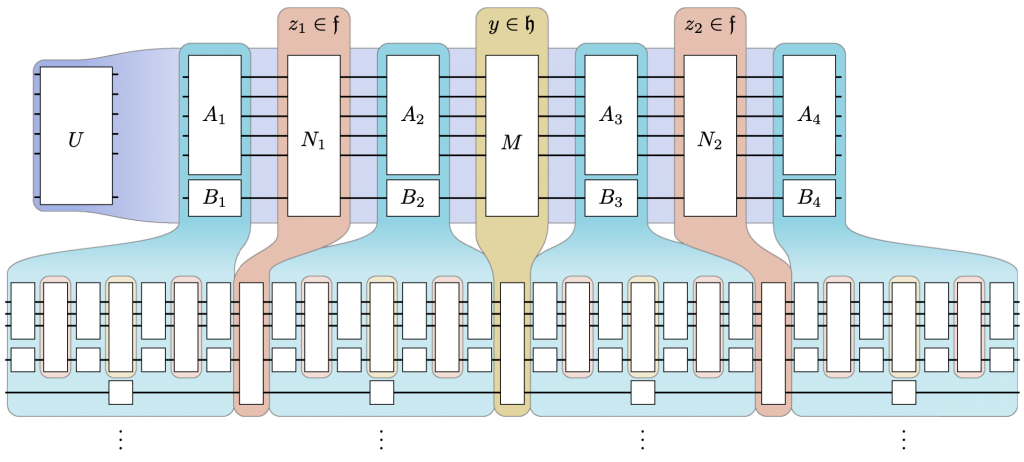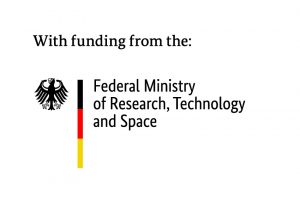
Bayesian Network Analysis and Inference via Quantum-supported Optimization (BAIQO)
About this Project
A major problem in industry and research is optimizing the planning and execution of clinical trials. In view of the high costs and long development times of drugs, pharmaceutical and biotech companies are looking for more efficient ways to bring drugs through the development phases in a more targeted, faster and safer way, for example by optimizing and accelerating patient recruitment.
The central goal of the BAIQO project is the design, development and evaluation of various quantum algorithms for the optimization of models generated from large data sets using machine learning (so-called Bayesian models).
As a use case, the project is investigating how clinical studies can be optimized. The extent to which different types of quantum algorithms can be used will also be investigated. Machine-derived models for clinical trials are often highly complex with many variables and dependencies between the variables. One research question in the project is therefore to what extent such models can generally be translated into optimization problems. The evaluation on currently available NISQ devices will further clarify whether there is a “quantum advantage” compared to classical approaches for optimizing clinical trials.
The Consortium

LMU Munich
The LMU Munich is acting as consortium leader in the project, taking on the majority of the project management. As a research institution with many years of expertise in the field of quantum computing (the LMU is, among other things, a founding partner of PlanQK), the LMU provides support in all research-intensive work packages. As a university research group, LMU’s QAR Lab plans to utilize the project results in teaching, scientific publications, and funding and research projects based on QCHALLenge.
Merck Healthcare KGaA
Merck Healthcare KGaA, Darmstadt, Germany is a leading science and technology company in the healthcare, life science, and electronics sectors. Merck has been an active player in the quantum computing scene for over ten years, with several publications in collaboration with QUTAC and through the BAIQO project, as well as specifically for QRC in collaboration with TU Darmstadt. Merck acts as an industry partner in a key role in defining relevant use cases, providing data, and validating the developed quantum methods in real research scenarios.
Project Results
Medical research is an essential contribution of science to the well-being of humanity. Every day, research is conducted into new methods of treating diseases. Testing drugs and treatment approaches is not without risk and is therefore carried out in medical studies. The study design is important for the success and accuracy of the studies. There are many factors that influence the outcome of a study. Examples of factors include the number of doctors, participating hospitals, and the prevalence of the disease, but also factors that are difficult to measure, such as awareness of the disease, for example through media coverage or information campaigns. In order to better control the design of studies, project partner Merck KGaA has created a decision tree from a large data set of old studies that models the influence of various factors on the target parameters. Mathematically, this structure is a Bayesian network.
This structure allows the target parameters to be simulated given the input parameters. This means that, given this number of doctors, hospitals, and prevalence, how high is the probability of a successful study? However, it is not possible to reverse the process and optimize individual input factors in the sense of: How many doctors and hospitals are needed to achieve a certain probability of success?
Alternative computational approaches must be used to invert the underlying Bayesian network. Quantum computing is one such approach. Quantum computers work with reversible operations, meaning that an operation can be inverted directly. The desired optimization can then be performed by partially inverting the Bayesian network.
The project was carried out in collaboration with Merck KGaA. The university partner in the Chair of Mobile and Distributed Systems at Ludwig Maximilian University in Munich focused primarily on quantum circuits, while Merck KGaA concentrated on the optimization and application of Bayesian networks.
Quantum circuits are necessary for calculating problems on quantum computers. These describe the operations to be performed on the qubits. The quantum circuits must be created individually for each problem, as there is still no direct translation from problem formulation to circuit elements. For the project implementation, we mainly use optimizable circuits inspired by machine learning methods. Individual circuit elements contain variables that are changeable. Using classical optimization methods, it is possible to adjust the values until the circuit corresponds to the model and can map the desired function or Bayesian network.

A decomposition of a matrix quantum circuit. Taken from the publication: M. B. Mansky et al, “Near-optimal Quantum Circuit Construction via Cartan Decomposition, Phys. Rev. A 108 (5) 052607, doi: 10.1103/PhysRevA.108.052607
In the course of the project, it became apparent that there are many different ways of representing the same network. This results in a high degree of symmetry in the solution space, meaning that many different solutions produce the same solution quality. This diversity has a negative effect on network modeling, and the learning approach no longer converges. To address this problem, symmetry-invariant circuits are considered, i.e., those that map all possible solution variants to a single one. This drastically reduces the search space. This approach of symmetry reduction is difficult or impossible to achieve with classical approaches. The construction of quantum circuits from individual elements allows the symmetries of the problem to be directly incorporated into the design of the approach, thereby achieving a better solution quality. The work on symmetry-invariant approaches is also reflected in the results published in the project.
Many of the results from the project represent a further development of quantum circuits in general. The inclusion of symmetries in circuit design leads to improved convergence on problems with high symmetry, regardless of the background of Bayesian networks. In total, the project has produced eleven scientific papers, two of which have been published in journals, five in scientific conference proceedings, and four are still awaiting publication outside of preprint servers. In addition, the quantum circuits researched are being implemented on real hardware. The results show that the hardware currently available is not yet sufficient for use on complex problems.
The published results range from the creation of quantum circuits from a target matrix to the efficient construction of symmetry-invariant quantum circuits, to their properties and behavior in quantum machine learning. The results represent important advances in the application of quantum circuits to complex problems and impressively demonstrate that the structure of the quantum circuit has a significant influence on the quality of the results. Among the secondary results of the project, the work on sampling problems on quantum computers stands out. This review paper presents the entire range of possible applications of sampling from complex distributions.
Publications
- M. B. Mansky u. a., „Symmetry-restricted quantum circuits are still well-behaved“, 26. Februar 2024, arXiv: arXiv:2402.16329. doi: 10.48550/arXiv.2402.16329.
- M. B. Mansky, S. L. Castillo, V. R. Puigvert, und C. Linnhoff-Popien, „Near-optimal quantum circuit construction via Cartan decomposition“, Phys. Rev. A, Bd. 108, Nr. 5, S. 052607, Nov. 2023, doi: 10.1103/PhysRevA.108.052607.
- M. B. Mansky, S. L. Castillo, V. R. Puigvert, und C. Linnhoff-Popien, „Permutation-invariant quantum circuits“, 22. Dezember 2023, arXiv: arXiv:2312.14909. doi: 10.48550/arXiv.2312.14909.
- M. B. Mansky, C. Kam, und C. Linnhoff-Popien, „A Constant Measurement Quantum Algorithm for Graph Connectivity“, 4. Dezember 2024, arXiv: arXiv:2411.15015. doi: 10.48550/arXiv.2411.15015.
- M. B. Mansky u. a., „Scaling of symmetry-restricted Lie groups“, Phys. Scr., Bd. 100, Nr. 8, S. 085222, Aug. 2025, doi: 10.1088/1402-4896/adf0ee.
- M. B. Mansky, J. Nüßlein, D. Bucher, D. Schuman, S. Zielinski, und C. Linnhoff-Popien, „Sampling problems on a Quantum Computer“, in 2023 IEEE International Conference on Quantum Computing and Engineering (QCE), Sep. 2023, S. 485–495. doi: 10.1109/QCE57702.2023.00062.
- M. B. Mansky, V. R. Puigvert, S. L. Castillo, und C. Linnhoff-Popien, „Decomposition Algorithm of an Arbitrary Pauli Exponential Through a Quantum Circuit“, in 2023 IEEE International Conference on Quantum Computing and Engineering (QCE), Sep. 2023, S. 434–442. doi: 10.1109/QCE57702.2023.00056.
- M. B. Mansky, T. Rohe, D. Bondarenko, L. Menzel, und C. Linnhoff-Popien, „Clique detection using symmetry-restricted quantum circuits“, 3. Juni 2025, arXiv: arXiv:2506.03339. doi: 10.48550/arXiv.2506.03339.
- M. B. Mansky, T. Rohe, L. Menzel, D. Bondarenko, und C. Linnhoff-Popien, „Analysis of quantum neural network performance via edge cases“, 14. Juni 2025, arXiv: arXiv:2506.12427. doi: 10.48550/arXiv.2506.12427.
- M. B. Mansky u. a., „Solving graph problems using permutation-invariant quantum machine learning“, 19. Mai 2025, arXiv: arXiv:2505.12764. doi: 10.48550/arXiv.2505.12764.
- M. B. Mansky, F. Wörle, J. K. Stein, R. Müller, und C. Linnhoff-Popien, „Adapting the DisCoCat-Model for Question Answering in the Chinese Language“, in 2023 IEEE International Conference on Quantum Computing and Engineering (QCE), Sep. 2023, S. 591–600. doi: 10.1109/QCE57702.2023.00073.
Contact
Please direct inquiries to the consortium to:
E-Mail: qar-lab@mobile.ifi.lmu.de
Telefon: +49 89 2180-9153
QAR-Lab – Quantum Applications and Research Laboratory
Ludwig-Maximilians-Universität München
Oettingenstraße 67
80538 München

Copyright © BAIQO | 2025

